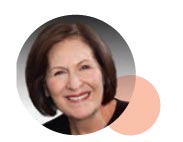Becoming an Informed Donor
Lou-Ellen Barkan
Founding Director

Last month, carefully inspecting a head of lettuce to establish its country of origin and organic status, I noticed that my trips to the market are longer. Not surprising, since I’m addicted to checking food packaging, lists of ingredients, sell by dates, and allergy warnings. Notwithstanding the time this takes, it’s time well spent. I leave the market smarter about what I am putting in my body and secure that I’ve spent my food budget wisely.
Recently I decided to put the same effort into researching the charitable organizations soliciting my support. Rather than react emotionally to puppies up for adoption, children who need medical care, seniors without a safety net and more, I do the research before I reach for my checkbook. I want to understand not only what an organization claims to do, but how they accomplish their mission, how they spend their funds and the outcomes of their work.
If a charity is local, I visit to see how my money is spent. I talk to staff, see the programs in action and chat with finance folks. It’s true that, as a not for profit executive, I have a list of good questions (which I’m happy to share), but in my opinion if all donors, large and small, took the time to do this research, our communities would be well served.
I recognize that there are “watchdog” agencies trying to accomplish this. Unfortunately, these agencies use complex algorithms and don’t always compare “apples to apples. For example, while charities funded by government have substantially different operations from those that rely on individual and foundation gifts, they are rated using the same criteria. This can make it very hard for us to compare or understand their reports.
So instead, let’s take the initiative to learn more before we write our checks. If a charity is local, let’s visit the organization and make calls to learn about the organization’s outcomes and operations. That way, when we do write those checks, we will be secure that our investment adds real value to real people.
I’m proud to say that CaringKind’s doors are open to all visitors who want to learn more. To schedule time to see us, just call our Helpline at 646-744-2900 and we will be happy to show you how we make a difference through the generosity of our community.
